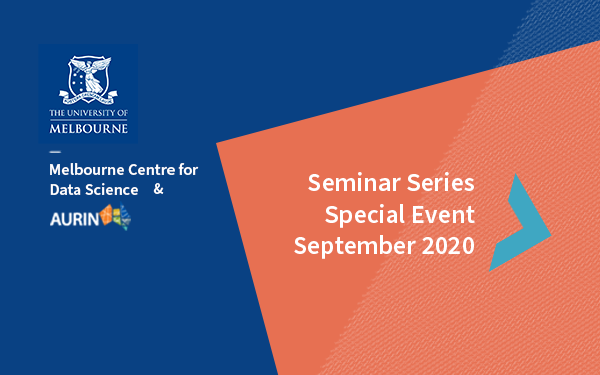MCDS Seminar Series special event jointly hosted by AURIN: Urban Analytics and Modelling the Pandemic (VIDEO RECORDING AND SLIDES AVAILABLE)

We were delighted to team up with our colleagues at the Australian Urban Research Infrastructure Network (AURIN) to host a three part seminar with esteemed researchers from The Alan Turing Institute and the Royal Society of the UK's Rapid Assistance in Modelling the Pandemic (RAMP) teams
This special event was held on Thursday 24 September from 5:30pm AEST and featured several talks:
- Urban Analytics: Progress and Prospects
- RAMP: Microsimulation and simulating behaviour
- RAMP: Simulating COVID-19 in the community and assessment of scenarios
Video recording of entire event above. Talk details below.
Title: Urban Analytics: Progress and Prospects - Download Slides from Mark Birkin
Abstract: The talk will provide some background to the development and applications of urban analytics within the academy and beyond. It will include an effort to define the scope and content of urban analytics, and will be situated within the broader landscape for data science and artificial intelligence in the UK. The thinking will be illustrated with some more detailed examples of ongoing research which hint at the diversity and impact of this work. I will conclude with a discussion of future possibilities and opportunities, and why all of this is important.
Speaker: Mark Birkin
Mark Birkin is Professor of Spatial Analysis and Policy and Director of the Consumer Data Research Centre (CDRC) at the University of Leeds, and Programme Director for Urban Analytics at the Alan Turing Institute. His research has spanned mathematical modelling and quantitative analysis of geographical systems ranging from retailing, transport systems and labour markets to health, education and crime. He has a long track record of engagement with business and governmental organisations through academic partnership and consultancy.
Title: RAMP: Microsimulation and simulating behaviour -
Download Slides from Adam Dennett and Richard Milton
Download Slides from Karyn Morrissey
Abstract: An overview of the generation of the synthetic population and the behaviour models used in our COVID model. The base population is generated using synthetic microsimulation, and additional characteristics added using propensity score matching. Various spatial interaction models are used to govern the behaviour and interactions of this population.
Speakers: Karyn Morrissey, Adam Dennett and Richard Milton
Karyn Morrissey is an Associate Professor in Population Health whose research focuses on understanding the impact of socio-economic and environmental inequalities on health outcomes, using data both big and small. An economist by background her multi-disciplinary approach centres on the application of computational methodologies such as simulation models, econometric models and geo-computation models.
Adam Dennett is a Senior Lecturer at UCL’s Centre for Advanced Spatial Analysis. He has a range of research interests which all fall broadly under the banner of quantitative human geography / urban analytics / geographic information science.
Richard Milton is a Senior Research Fellow in the Centre for Advanced Spatial Analysis, currently working on the QUANT urban analytics project in conjunction with the Alan Turing Institute. He is the developer behind the QUANT website for online spatial interaction modelling and also the MapTube website for sharing maps online. Current interests include AI and Machine Learning, applied to both drone projects and urban modelling, along with real-time city data, mapping, graphics and visualisation.
Title: RAMP: Simulating COVID-19 in the community and assessment of scenarios
Slides will be available soon
Abstract: An overview of how our COVID-19 simulation model dynamically updates the disease status of individuals within the population based on location and interactions with others. We will cover details of how the SEIR status of individuals are updated daily, based on the extent of possible interactions with individuals who have the disease (both symptomatic and asymptomatic) and present preliminary results for a range of potential lockdown scenarios.
Speakers: Gavin Shaddick and Nick Malleson
Gavin Shaddick is Chair of Data Science and Statistics at the University of Exeter and Director of the UKRI CDT in Environmental Intelligence. His research interests include the theory and application of spatio-temporal modelling and Bayesian hierarchical models in a number of fields including epidemiology, environmental modelling, and disease progression in rheumatology. Of particular interest are computational techniques that allow the implementation of complex statistical models to real-life applications where the scope over both space and time may be very large.
Nick Malleson is Professor of Spatial Science at the Centre for Spatial Analysis and Policy at the School of Geography, University of Leeds, UK. He has a PhD in Geography and undergraduate degrees in Computer Science (BSc) and Multidiciplinary Informatics (MSc). Most of his research focuses on the development of computer models that can help to understand social phenomena. He has particular interests in simulations of crime patterns, and in models that can be used to describe the flows of people around cities. More recently, he has become in interested in how 'big data', agent-based modelling, and smart cities initiatives can be used to reduce the impacts of problems like pollution or crime.